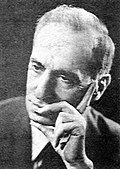Michel Aflaq
| Michel Aflaq | |
|---|---|
 |
|
| Secretary General of the National Command of the Iraq-based Ba'ath Party | |
|
In office February 1968 – 23 June 1989 |
|
| Deputy | Shibli al-Aysami |
| Preceded by | None–post established |
| Succeeded by | Saddam Hussein |
| Secretary General of the National Command of the Arab Socialist Ba'ath Party | |
|
In office 1954 – April 1965 |
|
| Preceded by | None–post established |
| Succeeded by | Munif al-Razzaz |
| Member of the National Command of the Arab Socialist Ba'ath Party | |
|
In office 6 April 1947 – 23 February 1966 |
|
| Personal details | |
| Born | 9 January 1910 Damascus, Ottoman Syria |
| Died | 23 June 1989 (aged 79) Paris, France |
| Political party |
Arab Ba'ath Movement (1940–1947) Arab Socialist Ba'ath Party (1947–1966) Iraq-based Ba'ath Party (1968–1989) |
| Religion | Greek Orthodox |
| Michel Aflaq | |
|---|---|
| Era | 20th century philosophy |
| Region | Eastern Philosophy |
| School | Ba'athism, Arab nationalism |
|
Main interests
|
Politics, philosophy, sociology, nationalism, philology history |
|
Notable ideas
|
Principal founder of Ba'athism (with al-Bitar and Zaki al-Arsuzi), The Battle for One Destiny, The Struggle Against Distorting the Movement of Arab Revolution |
|
Influenced
|
|
Michel Aflaq (Arabic: ميشيل عفلق, Arabic pronunciation: [miːʃeːl ʕaflaq], 9 January 1910 – 23 June 1989) was a Syrian philosopher, sociologist and Arab nationalist. His ideas played a significant role in the development of Ba'athism and its political movement; he is considered by several Ba'athists to be the principal founder of Ba'athist thought. He published various books during his lifetime, the most notable being The Battle for One Destiny (1958) and The Struggle Against Distorting the Movement of Arab Revolution (1975).
Born into a middle-class family in Damascus, Syria, Aflaq studied at the Sorbonne, where he met his future political companion Salah al-Din al-Bitar. He returned to Syria in 1932, and began his political career in communist politics. Aflaq became a communist activist, but broke his ties with the communist movement when the Syrian–Lebanese Communist Party supported France's colonial policies. Later in 1940 Aflaq and al-Bitar established the Arab Ihya Movement (later renaming itself the Arab Ba'ath Movement, taking the name from Zaki al-Arsuzi's group by the same name). The movement proved successful, and in 1947 the Arab Ba'ath Movement merged with al-Arsuzi's Arab Ba'ath organisation to establish the Arab Ba'ath Party. Aflaq was elected to the party's executive committee and was elected "'Amid" (meaning the party's leader).
The Arab Ba'ath Party merged with Akram al-Hawrani's Arab Socialist Party to establish the Arab Socialist Ba'ath Party in 1952; Aflaq was elected the party's leader in 1954. During the mid-to-late 1950s the party began developing relations with Gamal Abdel Nasser, the President of Egypt, which eventually led to the establishment of the United Arab Republic (UAR). Nasser forced Aflaq to dissolve the party, which he did, but without consulting with party members. Shortly after the UAR's dissolution, Aflaq was reelected as Secretary General of the National Command of the Ba'ath Party. Following the 8th of March Revolution, Aflaq's position within the party was weakened to such an extent that he was forced to resign as the party's leader in 1965. Aflaq was ousted during the 1966 Syrian coup d'état, which led to a schism within the Ba'ath Party. He escaped to Lebanon, but later went to Iraq. In 1968 Aflaq was elected Secretary General of the Iraqi-led Ba'ath Party; during his tenure he held no de facto power. He held the post until his death on 23 June 1989.
...
Wikipedia
